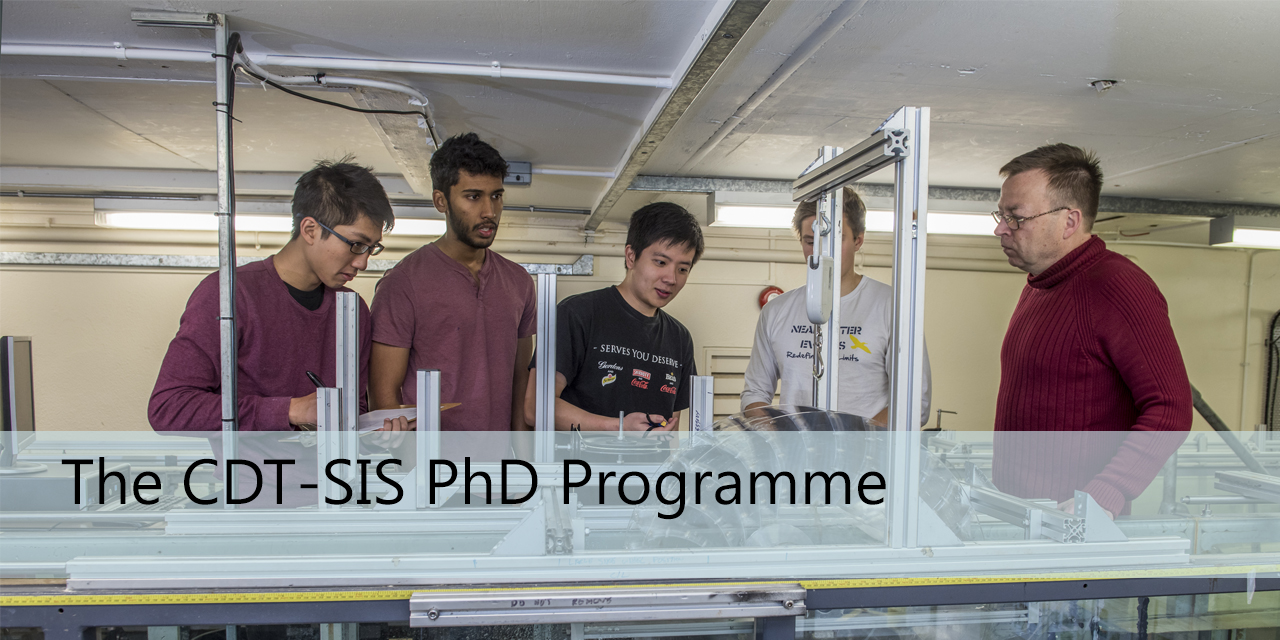Programme Overview
The Centre for Doctoral Training in Sustainable Infrastructure Systems offer a four year integrated PhD or EngD programme. The extended period of time associated with these programmes beyond the usual PhD period allows for training in a broad range of sustainability issues and to foster multi-disciplinary collaborative skills that will create future leaders for both industry and research. Both integrated PhD and EngD follow the same course structure as outlined below;
The taught component will be delivered in the first year of the programme and will take the form of various modules some of which have been specifically designed for the CDT and others which will be specific to each research project.
The group research project involves a real world challenge that is currently faced by industry. Groups of students with relevant research backgrounds will work together on an international placement. This brings together a group of students and supervisors with different interests and core expertise to address the challenge. This encourages interdisciplinary team working and allows students to be part of a much broader project than normally involved in PhD training.
Delivering high quality research training is an absolutely key aim of the CDT in Sustainable Infrastructure Systems. Prospective students should view the current research page (HERE) to see the breadth of research currently being conducted by the CDT and the projects we are currently recruiting to HERE . The majority of these will involve working with a small team of supervisors from across the faculty and beyond. We aim to provide the best possible supervisory team to deliver the best possible research training experience to CDT students.
We also expect that the majority of CDT projects will have significant industrial involvement, both in defining the project, providing input to the research and opportunities to see the benefits of the research. This may include a placement with the industrial sponsor of your project.
Although CDT students will know their research area when they join the CDT it is not until after the taught component and the group research project are completed at the end of the second term that CDT students are able to work full-time on their doctoral research. This begins with the individual research project conducted over the summer of your first year which will be the very start of your PhD research. The CDT provides funding for four years and it is expected that CDT students submit within this time however a nominal fifth year of candidature is provided at the end of the PhD for writing up if necessary. In addition to the thesis we expect CDT students to publish their work in internationally leading journals and they should attend at least one relevant national or international conference.
CDT research projects are at the very forefront of research in sustainable civil engineering and will provide our students with the skills necessary to become future leaders in research and industry.
Eligibility
The CDT is looking to recruit students with a first class or high upper second class degree in engineering and the physcial, natural and biological sciences. Applicants will be judged on their enthusiasm and academic quality, their existing skills and their potential for contributing to the CDT. The CDT aims to foster considerable diversity — indeed we think this variety is an important asset. A first year of carefully organised taught training is designed to allow this diverse intake to learn from and support each other while they are taught to develop the key skills and knowledge that will allow them to pursue subsequent research.
Funding
The CDT studentship covers;
- Full fees paid (EU/UK)
- £15k Tax Free Stipend Per Annum
- Suport Grant for Training and Development
The CDT in Sustainable Infrastructure Systems can offer funded studentships to excellent UK and EU students eligible for Engineering and Physical Sciences Council (EPSRC) studentship awards. Applications are reviewed and prospective students are interviewed continuously. There is no separate application process for this funding. Eligible candidates will be considered automatically after they submit their application. Candidates are encouraged to submit their application as soon as possible since there is a limit on the number of funded places.
Guidance regarding eligibility for EPSRC funding**
- UK Nationals – UK applicants that have settled status in the UK and have studied or worked in the UK for the past 3 years are eligible for full fees and stipend.
- EU Nationals – Non-UK EU applicants that have settled status in the UK and have studied or worked in the UK for the past 3 years are eligible for full fees and stipend.
- Non-EU Nationals – Non-EU applicants that have settled status in the UK and have worked in the UK (this does not include full time education) for the past 3 years are eligible for full fees and stipend.
For further information on eligibility please see the EPSRC website.
**In case of any discrepancies between the listed guidance and that published by the EPSRC, the EPSRC guidance is over-riding.



